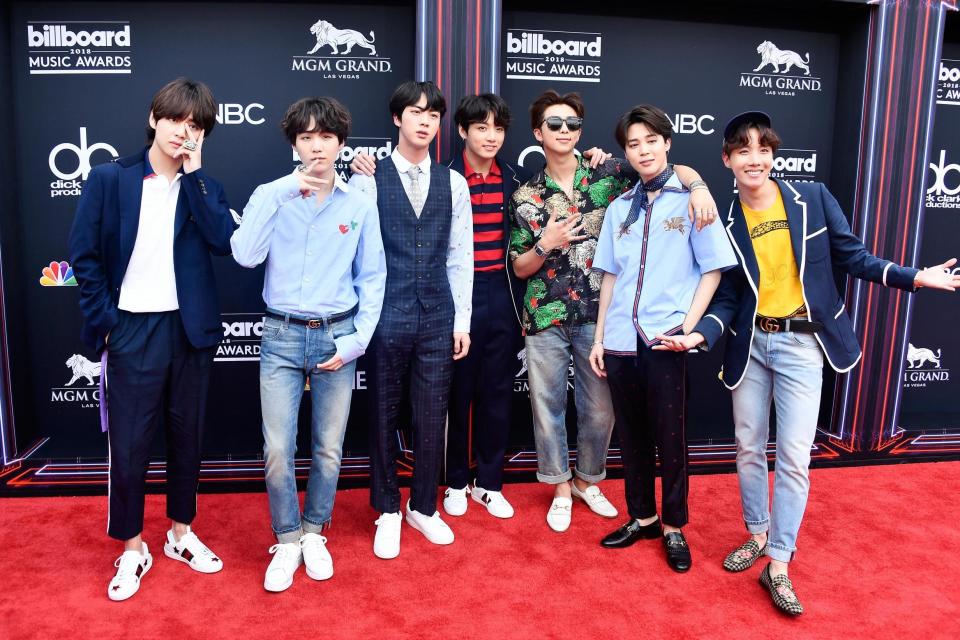BTS and Ed Sheeran rumours: Five biggest genre-crossing collaborations from Run-DMC/Aerosmith to Weezer/Lil Wayne
Ed Sheeran could soon dip his feet into the world of K-Pop, if a cryptic tweet from a BTS member is to be believed.
A message from the band signed by Suga, one of the group's seven members, appeared to tease a possible collaboration with the British singer when he shared a screenshot of a sound-editing software next to the words: "Hmm... this is for you @edsheeran."
Fans were eager to find out more, but that's all that has surfaced so far about a potential joint track between Sheeran and the South Korean band, who are both among the best-selling live artists in the world.
It might seem hard to imagine what a Sheeran-BTS crossover might sound like – a romantic ballad with K-Pop undertones? – but if a collaboration does happen, it wouldn't be the first time artists reach across genres. Recent music history has seen pairings such as Weezer and Lil Wayne, or Slash and Fergie, crop up to deliver unique – and memorable for all kinds of reasons – tunes.
Here are five of the most high-profile, genre-crossing collaborations in recent years:
hmm... this is for you @edsheeran #SUGA pic.twitter.com/QVKy3TaAVh
— 방탄소년단 (@BTS_twt) December 5, 2018
Justin Bieber and Busta Rhymes – "Drummer Boy"
This might be the genre-crossing song to rule them all.
Included in Justin Bieber's Christmas album Under the Mistletoe, the second of his four studio albums so far, "Drummer Boy" begins with a rather classic rendition of the popular Christmas carol by Bieber – until he starts rapping a few lyrics, including one passage that says he's "Playing for the King, playing for the title / I'm surprised you didn't hear this in the Bible".
Busta Rhymes takes over later in the song to rap about "Sipping eggnog, with a little sprinkle of vanilla / Even though it's kind of cool I'm pulling on a chinchilla".
Aerosmith and Run-DMC – "Walk This Way"
"Walk This Way" originally came out in 1975 but found a second life when the hip-hop group Run-DMC recorded their own version in 1986.
Steven Tyler joined them for guest vocals and appears in the song's music video, symbolically breaking a wall separating him from Joseph Simmons, Darryl McDaniels, and Jason Mizell, the three members of Run-
DMC.
The song brought Aerosmith back in the spotlight and proved to be a success, reaching fourth position in Billboard's Hot 100 chart.
Weezer and Lil Wayne – "Can't Stop Partying"
In 2009, Weezer made headlines by releasing a version of its song "Can't Stop Partying" – previously unveiled on their album Alone II – featuring a bridge by rapper Lil Wayne. The revamped tune appears on Weezer's 2009 album Radtitude.
Weezer frontman Rivers Cuomo told Pitchfork at the time that he hadn't actually recorded with Lil Wayne in the studio but would love to meet him.
"It might be my favourite track on the album," he said of the song, adding that Lil Wayne "topped it off with this rap from the edge of the grave".
Slash and Fergie – "Beautiful Dangerous"
When Slash released his debut solo album in 2010, he unveiled collaborations with several vocalists, some expected (Ian Astbury, Ozzy Osbourne), some less (Adam Levine, Fergie).
Fergie sings "Beautiful Dangerous", a sensual hard rock tune, the third song on the album, which was also released a single.
Slash, who also performed "Sweet Child O' Mine" on stage with Fergie, told Reuters shortly after the release of the album that Fergie "has this amazing rock ‘n’ roll voice and she’s sort of a closet rock ‘n’ roll singer".
"She’s got a lot of balls," he added. "For a female rock singer she’s one of the best women I’ve ever heard.”
Lou Reed and Metallica – Lulu
In 2011, Lou Reed and Metallica teamed up not just for a song, but for an entire album: the avant-garde, overall poorly received Lulu.
The disc failed to hit the mark with critics. Pitchfork's Stuart Berman gave it a 1.0 rating, writing: "For all the hilarity that ought to ensue here, Lulu is a frustratingly noble failure.
"Audacious to the extreme, but exhaustingly tedious as a result, its few interesting ideas are stretched out beyond the point of utility and pounded into submission – the average song length clocks in at eight excruciating minutes."
Lulu did, however, win one notable fan: David Bowie, who according to a speech given by Reed's widow Laurie Anderson after his death, deemed it Reed's greatest work.

 Yahoo News
Yahoo News 

